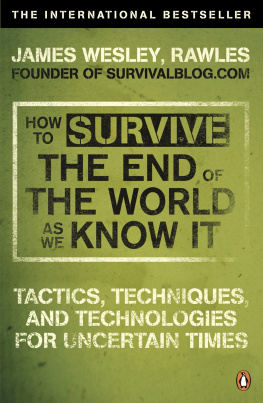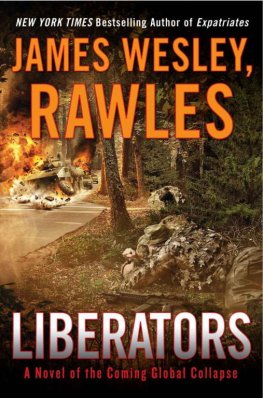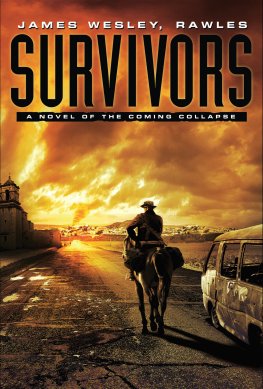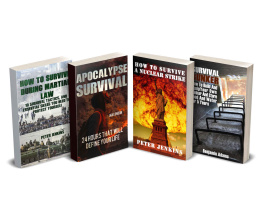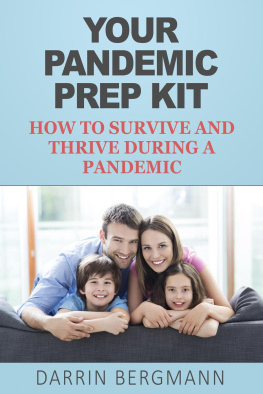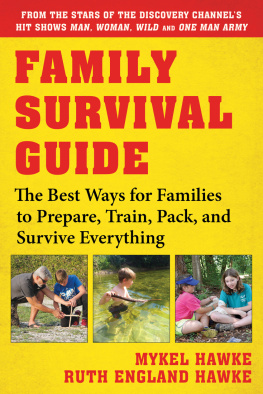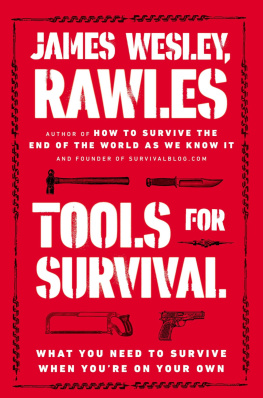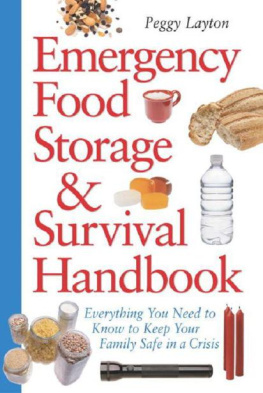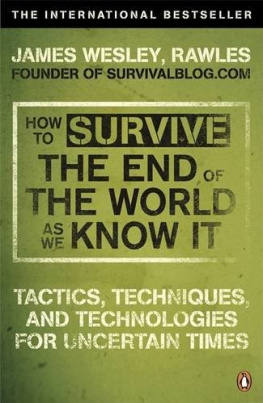HOW TO SURVIVE THE END OF THE WORLD AS WE KNOW IT
Tactics, Techniques and Technologies for Uncertain Times
James Wesley, Rawles

PENGUIN BOOKS
PENGUIN BOOKS
Published by the Penguin Group
Penguin Books Ltd, 80 Strand, London WC2R 0RL , England
Penguin Group (USA) Inc., 375 Hudson Street, New York, New York 10014, USA
Penguin Group (Canada), 90 Eglinton Avenue East, Suite 700, Toronto, Ontario, Canada M4P 2Y3
(a division of Pearson Penguin Canada Inc.)
Penguin Ireland, 25 St Stephens Green, Dublin 2, Ireland (a division of Penguin Books Ltd)
Penguin Group (Australia), 250 Camberwell Road,
Camberwell, Victoria 3124, Australia (a division of Pearson Australia Group Pty Ltd)
Penguin Books India Pvt Ltd, 11 Community Centre, Panchsheel Park, New Delhi 110 017, India
Penguin Group (NZ), 67 Apollo Drive, Rosedale, North Shore 0632, New Zealand
(a division of Pearson New Zealand Ltd)
Penguin Books (South Africa) (Pty) Ltd, 24 Sturdee Avenue, Rosebank, Johannesburg 2196, South Africa
Penguin Books Ltd, Registered Offices: 80 Strand, London WC2R 0RL , England
www.penguin.com
First published in the United States of America by Plume, a member of Penguin Group (USA) Inc. 2009
First published in Great Britain in Penguin Books 2009
Copyright James Wesley, Rawles, 2009
All rights reserved
The moral right of the author has been asserted
Except in the United States of America, this book is sold subject to the condition that it shall not, by way of trade or otherwise, be lent, re-sold, hired out, or otherwise circulated without the publishers prior consent in any form of binding or cover other than that in which it is published and without a similar condition including this condition being imposed on the subsequent purchaser
ISBN: 978-0-14-104934-2
PENGUIN BOOKS
HOW TO SURVIVE THE END OF THE WORLD AS WE KNOW IT
James Wesley, Rawles is the founder and editor of SurvivalBlog.com, the internets most popular blog on family preparedness. He is a world-renowned expert on a wide range of preparedness topics, including food storage, fuel shortage, self-defence, communications, retreat security, bug out bags, survival vehicles, retreat architecture, gardening for self-sufficiency, small livestock and a wide variety of traditional pioneer and self-sufficiency skills.
The author is a former US Army Intelligence officer. His preparedness consulting clients have included Fortune 500 executives, clergy, entrepreneurs and fund managers. An influential figure in the modern preparedness movement, Rawles not only talks the talk, but he walks the walk: he and his family live at a well-stocked and fully self-sufficient retreat that is nestled in a mountain range somewhere west of the Rockies.
Acknowledgments
My sincere thanks to the more than 135,000 SurvivalBlog readers. Thank you for sharing your tremendous knowledge and insights.
Special thanks to the Memsahib for her tremendous support.
Thanks also to Michael Z. Williamson and to my Penguin Books editor, Becky Cole, for her patience and her eagle eye.
INTRODUCTION
An Extremely Fragile Society
W e live in a time of relative prosperity. Our health care is excellent, our grocery-store shelves bulge with a huge assortment of fresh foods, and our telecommunications systems are lightning fast. We have cheap transportation, with our cities linked by an elaborate and fairly well-maintained system of roads, freeways, rails, canals, seaports, and airports. For the first time in human history, the majority of the worlds population now lives in cities.
But the downside to all this abundance is overcomplexity, overspecialization, and overly long supply chains. In the First World, less than 2 percent of the population is engaged in agriculture or fishing. Ponder that for a moment: Just 2 percent of us are feeding the other 98 percent. The food on our tables often comes from hundreds if not thousands of miles away. Our heating and lighting are typically provided by power sources hundreds of miles away. For many people, even their tap water travels that far. Our factories produce sophisticated cars and electronics that have subcomponents that are sourced from three continents. The average American comes home from work each day to find that his refrigerator is well-stocked with food, his lights come on reliably, his telephone works, his tap gushes pure water, his toilet flushes, his paycheck has been automatically deposited to his bank, his garbage has been collected, his house is a comfortable seventy degrees, his televised entertainment is up and running 24/7, and his Internet connection is rock solid. Weve built a very Big Machine that up until now has worked remarkably well, with just a few glitches. But that may not always be the case. As Napoleon found out the hard way, long chains of supply and communication are fragile and vulnerable. Someday the Big Machine may grind to a halt.
Let me describe just one set of circumstances that could cause that to happen:
Imagine the greatest of all influenza pandemics, spread by casual contacta virus so virulent that it kills more than half of the people infected. And imagine the advance of a disease so rapid that it makes its way around the globe in less than a week. (Isnt modern jet air travel grand?) Consider that we have global news media that is so rabid for hot news that they cant resist showing pictures of men in respirators, rubber gloves, goggles, and Tyvek coveralls wheeling gurneys out of houses, laden with body bags. These scenes will be repeated so many times that the majority of citizens decides Im not going to go to work tomorrow, or the day after, or in fact until after things get better. But by not going to work, some important cogs will be missing from the Big Machine.
What will happen when the Big Machine is missing pieces? Orders wont get processed at the Walmart distribution center. The 18-wheelers wont make deliveries to groceries stores. Gas stations will run out of fuel. Some policemen and firemen wont show up for work, having decided that protecting their own families is their top priority. Power lines will get knocked down in windstorms, and there will be nobody to repair them. Crops will rot in the fields and orchards because there will be nobody to pick them, or transport them, or magically bake them into Pop-Tarts, or stock them on your supermarket shelf. The Big Machine will be broken.
Does this sound scary? Sure it does, and it should. The implications are huge. But it gets worse: The average suburban family has only about a weeks worth of food in their pantry. Lets say the pandemic continues for weeks or months on endwhat will they do when that food is gone and there is no reasonably immediate prospect of resupply? Supermarket shelves will be stripped bare. Faced with the prospect of staying home and starving or going out to meet Mr. Influenza, millions of Joe Americans will be forced to go out and forage for food. The first likely targets will be restaurants, stores, and food- distribution warehouses. As the crisis deepens, not a few foragers will soon transition to full-scale looting, taking the little that their neighbors have left. Next, theyll move on to farms that are in close proximity to cities. A few looters will form gangs that will be highly mobile and well armed, ranging deeper and deeper into farmlands, running their vehicles on surreptitiously siphoned gasoline. Eventually their luck will run out and they will all die of the flu, or of lead poisoning. But before the looters are all dead they will do a tremendous amount of damage. You must be ready for a coming crisis. Your life and the lives of your loved ones will depend on it.

